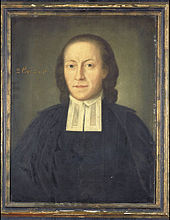Henric Schartau

Henric Schartau (born September 27, 1757 in Malmö , † February 3, 1825 in Lund ) was a Swedish pastor , preacher and initiator of a Swedish revival movement , the so-called Schartauanism .
Henric Schartau, a son of the lawyer Anders Schartau , began studying theology at Lund University in 1771 . In 1774 he passed the candidate exam, in 1778 he was awarded a master's degree. He first worked as a private tutor, was ordained in 1780 and took over a position as house chaplain to Vice Admiral Christopher Falkengréen . From 1783 he was briefly battalion preacher in Malmö. In 1785 he became pastor in Lund, where he worked until his death, from 1793 as the first town councilor and priest pastor in Stora Råby and Bjellerup . In 1800 he was also provost part-time. As a member of the parish priesthood, he took part in the four- class council in 1810 .
From 1786 Schartau was married to Catharina (Cajsa) Elisabeth Sommelius (1754-1836). His children include the fencing master Gustaf Johan Schartau (1794-1852), who made a first attempt in 1834 to revive the Olympic Games , and Anna Catharina Schartau (* 1796), from 1820 married to the philologist Johan Norrman . The officer and writer Ivar Eilert Schartau was a stepson.
At the beginning of his pastoral activity, Schartau was theologically close to the Moravian Brethren , but broke with their emotional religiosity in 1787. He took an Orthodox Lutheran direction with an emphasis on the development of spiritual life within the framework of the ordo salutis . Schartau attracted attention with its strict and conservative sermons and won numerous followers among the younger pastors. His teaching led to a revival movement within the Swedish state church , especially in Skåne and in the diocese of Gothenburg . Schartauanism can still be found today in Bohuslän and southern Västergötland . Almost all of his writings were only published posthumously by his students.
In his novella Wages of Virtue ( Dygdens lön ) August Strindberg ironically processed Schartau's dictum of the “nullity of reason”, according to which reason is a great sin because it is preparing to understand what should not be understood. Since no explanation is given for why this “it” should not be understood, Strindberg's protagonist suspects that otherwise the great deception of Christianity would be exposed.
Fonts (selection)
- Utkast till predikningar. Stockholm 1827/28.
- Bref i andeliga mnen. Stockholm 1828-30.
- Undervisning i christendomskunskapen. Stockholm 1835.
- Predikningar. Till större delen i utförligare utkast. 1-4. Stockholm 1843–1861.
- Utkast till offentliga förhör, tillika med afhandlingar i frågor och swar öfwer några stycken af christendomskunskapen. Lund 1850.
literature
- Schartau, Henrik . In: Herman Hofberg, Frithiof Heurlin, Viktor Millqvist, Olof Rubenson (eds.): Svenskt biografiskt handlexikon . 2nd Edition. tape 2 : L – Z, including supplement . Albert Bonniers Verlag, Stockholm 1906, p. 421-422 (Swedish, runeberg.org ).
- Jarlert is different : Henric Schartau . In: Svenskt biografiskt lexikon , Volume 31, 2000-2002, p. 466 ff, riksarkivet.se
- Wolfdietrich von Kloeden : Schartau, Henrik. In: Biographisch-Bibliographisches Kirchenlexikon (BBKL). Volume 9, Bautz, Herzberg 1995, ISBN 3-88309-058-1 , Sp. 9-11.
- Martin Friedrich : Schartau, Henrik. In: Religion in Past and Present , 4th ed., Volume 7, Col. 868.
Web links
- Literature by and about Henric Schartau in the catalog of the German National Library
- Heinrich Schartau - life and teaching
Individual evidence
- ↑ Åke Jönsson: Olympiska spelen i Ramlösa blev ingen succé on the Popular historia website , accessed on November 29, 2019.
- ↑ by Magnus Laurentius Ståhl: Biographiske Underrättelser om Professorer vid Kongl. Universitetet i Lund. P. 353.
| personal data | |
|---|---|
| SURNAME | Schartau, Henric |
| ALTERNATIVE NAMES | Schartau, Henrik; Schartau, Heinrich |
| BRIEF DESCRIPTION | Swedish pastor, preacher and initiator of a Swedish revival movement, the so-called Schartauanism |
| DATE OF BIRTH | September 27, 1757 |
| PLACE OF BIRTH | Malmo |
| DATE OF DEATH | February 3, 1825 |
| Place of death | Lund |
